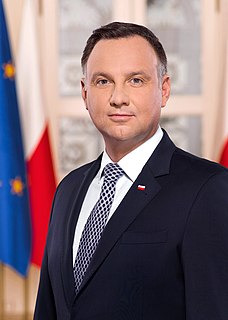A Quote by Susan Sontag
One set of messages of the society we live in is: Consume. Grow. Do what you want. Amuse yourselves. The very working of this economic system, which has bestowed these unprecedented liberties, most cherished in the form of physical mobility and material prosperity, depends on encouraging people to defy limits.
Related Quotes
We are profoundly grateful for the blessings bestowed upon us: the preservation of our freedom, so dearly bought and so highly prized; our opportunities for human welfare and happiness, so limitless in their scope; our material prosperity, so far surpassing that of earlier years; and our private spiritual blessings, so deeply cherished by all. For these we offer fervent thanks to God.
A lot of young Poles, very well educated ones, are living in Britain. They are working hard. Of course they are building their own prosperity, but they are also contributing to the economic prosperity of the United Kingdom and surely I can say - and this is underpinned by the economic data - they bring in more than they take away.
Now it is unambiguously clear that trickle-down economics does not work. But what does that mean? That means we have to structure our economic policies to make sure that we have shared prosperity. And you don't do that by giving a tax cut to the big winners and raising taxes on those who have not done very well. Your economic policy has to respond to the way our economic system has been working.
Scholars, who pride themselves on speaking their minds, often engage in a form of self-censorship which is called "realism." To be "realistic" in dealing with a problem is to work only among the alternatives which the most powerful in society put forth. It is as if we are all confined to a, b, c, or d in the multiple choice test, when we know there is another possible answer. American society, although it has more freedom of expression than most societies in the world, thus sets limits beyond which respectable people are not supposed to think or speak.
As long as we place millions of Indians at the canter of our thought process, as long as we think of their welfare, their future, their opportunities for self realization we are on the right track. For India can grow, prosper, flourish only if they grow, prosper, flourish. We cannot grow by any esoteric strategies. Our purchasing power, our economic strength, our marketplace all depends on the prosperity of our people.
Why shouldn't I be interested in politics? That is to say, what blindness, what deafness, what density of ideology would have to weigh me down to prevent me from being interested in what is probably the most crucial subject to our existence, that is to say the society in which we live, the economic relations within which it functions, and the system of power which defines the regular forms and the regular permissions and prohibitions of our conduct. The essence of our life consists, after all, of the political functioning of the society in which we find ourselves.
The branches of mathematics are as various as the sciences to which they belong, and each subject of physical enquiry has its appropriate mathematics. In every form of material manifestation, there is a corresponding form of human thought, so that the human mind is as wide in its range of thought as the physical universe in which it thinks.
I think that one of the things that we all agree to is that the touchstone for economic policy is, does it allow the average American to find good employment and see their incomes rise; that we can't just look at things in the aggregate, we do want to grow the pie, but we want to make sure that prosperity is spread across the spectrum of regions and occupations and genders and races; and that economic policy should focus on growing the pie, but it also has to make sure that everybody has got opportunity in that system.
































